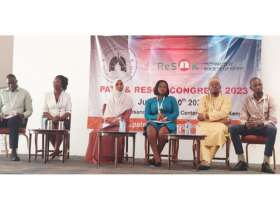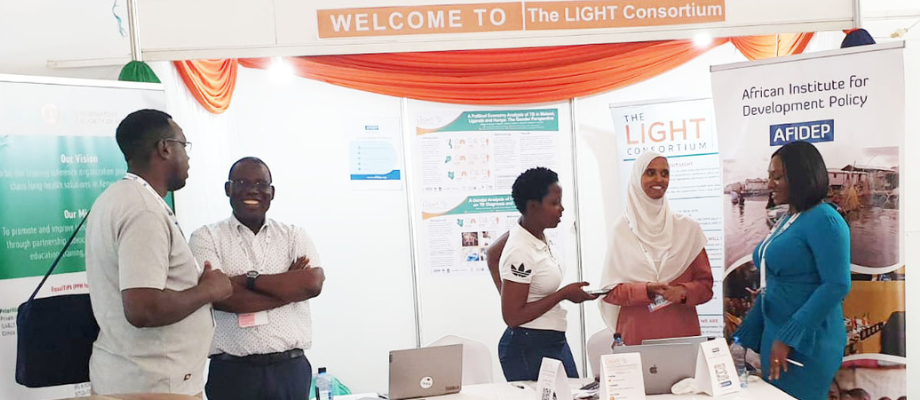
Respiratory diseases are persistently rising in African countries. These diseases affect the lungs and airways, and include tuberculosis (TB), pneumonia and asthma. Poor lung health is associated with air pollution from multiple sources e.g., cars, industries, firewood and tobacco smoking and poorly planned neighbourhoods devoid of social amenities and strong health systems, affecting the most vulnerable. This rise of respiratory diseases and the need for multidisciplinary and multisectoral approaches to address the root causes was at the centre of discussions at the 3rd Biennial Pan African Thoracic Society Congress.
The Congress, which took place on June 7–10, 2023, was jointly organised by the Pan African Thoracic Society (PATS) and Respiratory Society of Kenya (ReSoK), and hosted over 400 delegates from across the African continent, UK and USA.
At a symposium with partner institutions to discuss research findings from a four-year International Multidisciplinary Programme to Address Lung Health and TB in Africa (IMPALA), Professor Jeremiah Chakaya, ReSoK’s Technical Director commented: “There is a need to address the underlying causes of rising respiratory diseases on the African continent, including climate change mitigation and adaptation. This means that we, as experts, must advocate especially at the policy level for interventions that can limit the predisposition of our people to poor health outcomes.” The IMPALA research programme provided new evidence on what could be done to leverage the relatively well-developed and funded TB programmes to tackle other neglected lung health issues. To maximise the impact of the research generated by the programme policy and programmes need to be informed and take up the research findings.
Dr Rose Oronje, Director of Public Policy and Knowledge Translation at the African Institute for Development Policy (AFIDEP), agreed with Prof. Chakaya that a lot more needs to be done to inform policy and programme decisions and actions, including cost-effectiveness and health technology assessment studies. “We must create strong systems and mechanisms that effectively channel research from academia to policymakers to inform their decisions in ending TB and improving lung health in Africa,” she said.
Professor Bertie Squire, a professor of Clinical Tropical Medicine at Liverpool School of Tropical Medicine (LSTM) further noted that “empowering individuals and teams to have confidence in research ensures multidisciplinary evidence is provided to inform credible policy decisions.”
ReSoK, AFIDEP and LSTM are also part of an ongoing research programme aiming to generate further evidence to address the socioeconomic determinants of TB, which is among the leading causes of mortality globally with an estimated 1.6 million deaths in 2021. The Leaving no-one behInd: transforming Gendered pathways to Health for TB (LIGHT) research programme focuses on gender-responsive pathways and approaches to improve health, socioeconomic and equity outcomes. TB cases are notably higher in males compared to females, and men also experience delays in seeking care for TB symptoms and therefore continue to transmit TB to other men, women and children.
Dr Stephen Mulupi, a postdoctoral fellow at ReSoK and also working with the LIGHT Consortium, is leading a study investigating gaps in the TB care cascade through a gender lens to generate actionable evidence to strengthen access to TB care among young male Kenyans. A gender-responsive approach has the potential to enhance TB care, improve treatment outcomes, and reduce the burden. However, as noted by Dr Leyla Abdullahi, AFIDEP’s LIGHT Consortium Research Uptake Manager, “the real test of any policy is committing the necessary resources to make it a reality.”
Combined efforts of researchers, policymakers, and implementers can help protect and improve lung health, reduce the burden of respiratory diseases, and promote overall wellbeing in Africa. A multisectoral strategy is essential to successfully address the rise in respiratory diseases, and evidence-informed policy solutions should be continually assessed and modified to address evolving and multifaceted challenges.

